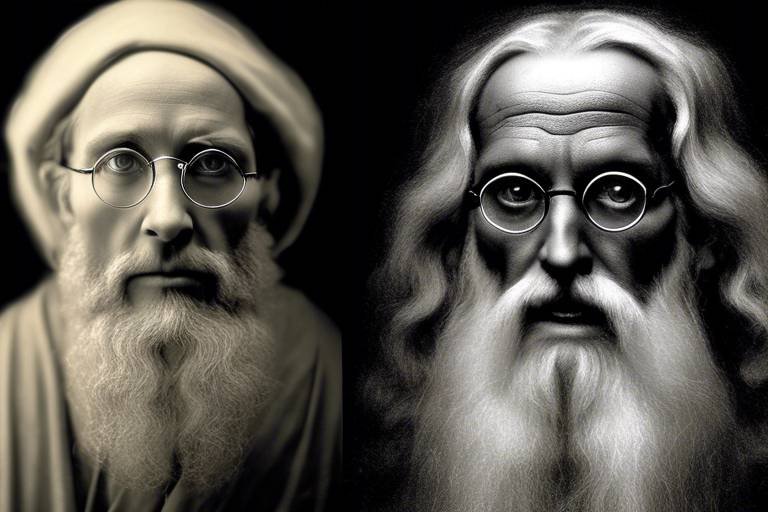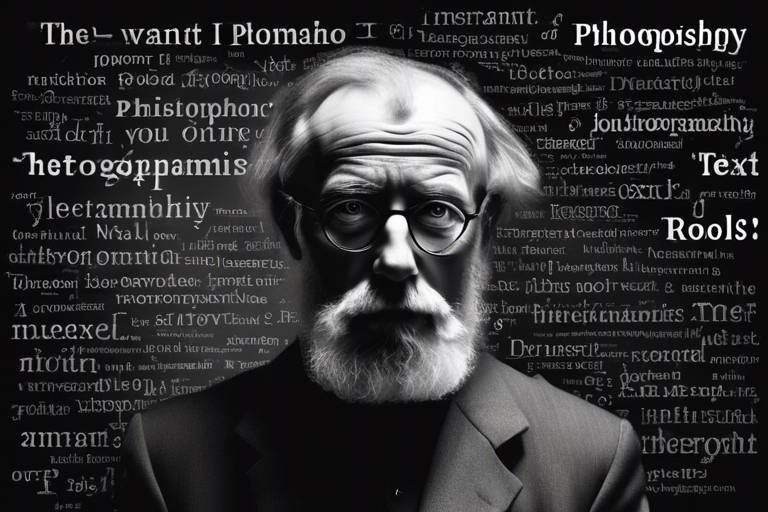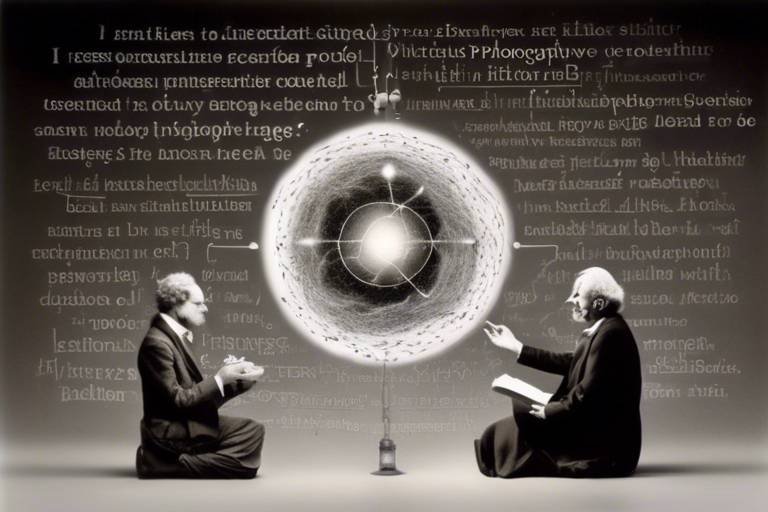Can the Study of Metaphysics Clarify Scientific Theories?
When we think of science, we often picture lab coats, test tubes, and complex equations. But what if I told you that there's a deeper layer to our understanding of the universe that involves philosophical inquiry? This is where metaphysics steps in. At its core, metaphysics is about exploring the fundamental nature of reality. It's the philosophical backdrop that asks the big questions: What is existence? What does it mean for something to be real? How do we know what we know? By delving into these questions, metaphysics can actually clarify and enrich scientific theories, providing a comprehensive framework for understanding the complexities of our world.
Imagine trying to navigate through a dense fog without a map. That’s what scientific inquiry can feel like without the guiding principles of metaphysics. It offers a broader context for empirical findings and theoretical frameworks, helping scientists to interpret their results in a meaningful way. For instance, when scientists observe phenomena, they are not just collecting data; they are also interpreting what that data means in the grand scheme of things. This is where metaphysical assumptions come into play, influencing how we understand everything from the tiniest particles to the vastness of the cosmos.
Moreover, the relationship between metaphysics and science is not a one-way street. While metaphysics provides foundational questions, scientific discoveries can also prompt new metaphysical inquiries. For example, the advent of quantum mechanics has raised profound questions about the nature of reality and causation. As we delve deeper into the mysteries of the universe, we find ourselves constantly reassessing our metaphysical beliefs. It’s a dynamic interplay that reflects the evolving nature of human knowledge.
In this article, we will explore how metaphysical inquiries can illuminate scientific concepts, enhance our understanding of reality, and ultimately lead to a more nuanced appreciation of the universe we inhabit. From historical perspectives to modern metaphysical approaches, we will uncover the rich tapestry that connects these two fields. So, buckle up as we embark on this intellectual journey that promises to surprise and enlighten!

The Role of Metaphysics in Science
Metaphysics serves as the backbone of scientific inquiry, providing foundational questions and assumptions that underpin our understanding of the universe. It goes beyond the empirical data gathered through observation and experimentation, delving into the why and how of existence itself. This philosophical branch encourages scientists to not only collect data but also to ponder the implications of their findings. For instance, when a physicist measures the speed of light, metaphysics prompts them to ask: What does this mean for our understanding of time and space?
At its core, metaphysics offers a broader context for interpreting empirical findings and theoretical frameworks. It challenges scientists to consider the underlying principles that govern the natural world. By addressing questions about reality, causation, and existence, metaphysics enriches scientific discussions and encourages a more holistic approach to inquiry. Think of it as the scaffolding that supports the structure of scientific knowledge, holding together various disciplines and perspectives.
Moreover, metaphysics fosters a deeper appreciation for the complexity of scientific concepts. For example, when discussing the nature of time, scientists might rely on metaphysical ideas to explore whether time is linear or cyclical. This kind of philosophical inquiry can lead to revolutionary insights that challenge established scientific paradigms. Without metaphysical considerations, scientific progress could become stagnant, as researchers might overlook the fundamental questions that drive their work.
In addition, metaphysical inquiries often lead to interdisciplinary collaboration. When philosophers and scientists engage in dialogue, they can bridge gaps between empirical research and abstract thought. This collaboration not only enhances scientific methodologies but also prompts new avenues of exploration. For instance, the intersection of metaphysics and quantum physics has led to innovative theories that challenge our understanding of reality.
Ultimately, the role of metaphysics in science is not merely supportive; it is transformative. By embracing metaphysical perspectives, scientists can cultivate a more nuanced understanding of their fields, leading to groundbreaking discoveries and a richer appreciation of the complexities of the universe.

Historical Perspectives on Metaphysics and Science
The relationship between metaphysics and science has been a subject of fascination and debate throughout history. From ancient philosophers to modern thinkers, the interplay of these two fields has shaped our understanding of the universe. Metaphysics, the branch of philosophy that explores the fundamental nature of reality, has often provided the conceptual groundwork upon which scientific inquiry is built. By examining historical figures and movements, we can uncover how metaphysical ideas have influenced scientific thought and led to significant developments in various disciplines.
One of the most profound influences in this regard came from the ancient Greek philosopher Plato. His theory of forms posited that the material world is merely a shadow of a higher, unchanging reality. This dualistic view laid the groundwork for later metaphysical discussions, particularly in the realm of epistemology, which is the study of knowledge and belief. Plato's ideas prompted thinkers to question the nature of existence and the limits of human understanding, ultimately influencing scientific methodologies in the pursuit of knowledge.
Following Plato, Aristotle emerged as a pivotal figure in the integration of metaphysics and science. Unlike his mentor, Aristotle emphasized empirical observation and the importance of studying the natural world. His metaphysical framework introduced concepts such as substance and causality, which became essential to scientific inquiry. For Aristotle, understanding the essence of a thing and its potential for change was crucial to grasping the workings of the universe. This approach not only shaped scientific methodologies but also established a foundation for future explorations in both philosophy and science.
As we move through history, we encounter the Scientific Revolution of the 16th and 17th centuries, a period marked by groundbreaking advancements in science. Thinkers like Galileo Galilei and Isaac Newton challenged established metaphysical views by introducing new methodologies based on observation and experimentation. Galileo's advocacy for the scientific method underscored the importance of empirical evidence, while Newton's laws of motion and universal gravitation provided a framework that blended metaphysical concepts with mathematical precision.
However, the relationship between metaphysics and science did not remain straightforward. The rise of empiricism in the 18th century, championed by philosophers such as David Hume, questioned the validity of metaphysical assumptions. Hume argued that knowledge should be grounded in sensory experience, leading to a skepticism towards metaphysical claims that could not be empirically verified. This tension between empiricism and metaphysics laid the groundwork for future philosophical debates, ultimately influencing the development of modern scientific theories.
In the 20th century, the emergence of quantum physics reignited discussions about the metaphysical implications of scientific discoveries. The strange behaviors of particles at the quantum level challenged traditional notions of reality and causation, prompting philosophers to reevaluate the relationship between observation and the nature of existence. As scientists grappled with these complexities, the dialogue between metaphysics and science became more pronounced, leading to innovative theories that sought to reconcile empirical findings with philosophical inquiries.
In summary, the historical perspectives on metaphysics and science reveal a rich tapestry of ideas and influences that have shaped our understanding of the universe. From the ancient philosophers who laid the groundwork for scientific thought to the modern thinkers who challenge our perceptions of reality, the interplay between these two fields continues to provoke deep questions about existence, knowledge, and the nature of inquiry.
- What is metaphysics? Metaphysics is a branch of philosophy that explores the fundamental nature of reality, including concepts such as existence, objects, and their properties.
- How has metaphysics influenced science? Metaphysics provides foundational questions and assumptions that underpin scientific inquiry, offering a broader context for understanding empirical findings and theoretical frameworks.
- Who were key historical figures in the relationship between metaphysics and science? Key figures include Plato, Aristotle, Galileo Galilei, Isaac Newton, and David Hume, each contributing to the dialogue between these fields.
- What role does metaphysics play in modern science? Metaphysics continues to challenge and enrich scientific paradigms, prompting deeper inquiries into the nature of existence and knowledge, especially in fields like quantum physics.

Aristotle's Influence
Aristotle, often hailed as the father of Western philosophy, profoundly influenced the development of scientific methodologies that we still rely on today. His metaphysical framework provided a robust foundation for understanding the natural world, emphasizing the significance of causality and substance. By asking fundamental questions about what things are and how they change, Aristotle set the stage for a systematic approach to inquiry that would resonate through the ages.
One of Aristotle's key contributions was the concept of substance. He argued that everything in the universe is composed of substances that possess inherent qualities. This idea paved the way for scientists to categorize and study the physical world in a more structured manner. Aristotle's emphasis on understanding the essence of things encouraged scientists to look beyond mere observations and delve into the underlying principles governing those observations. For instance, when studying a tree, Aristotle would urge us to consider not just its physical attributes but also its purpose and function within the ecosystem.
Moreover, Aristotle's notion of change is crucial for scientific progress. He proposed that change occurs through a process of potentiality and actuality. In simpler terms, something has the potential to change, and when that potential is realized, it becomes actual. This framework allows scientists to explore how entities evolve over time, whether it be the metamorphosis of a caterpillar into a butterfly or the transformation of a star into a supernova. By understanding these processes, we gain insights into the laws of nature that govern all forms of existence.
Another significant aspect of Aristotle's influence is his concept of teleology, which suggests that natural phenomena have purpose or end goals. In a world that often seems chaotic, Aristotle's perspective invites us to consider whether there is an underlying order or intention behind natural events. For instance, in biology, the study of evolutionary processes raises questions about whether species adapt simply by chance or if there is a directed purpose behind their development. This teleological view has sparked debates that continue to this day, prompting scientists to examine the implications of purpose in the natural world.
In summary, Aristotle's influence on science is profound and enduring. His ideas about substance, change, and teleology not only shaped the early foundations of scientific inquiry but also continue to resonate in contemporary discussions. As we explore the complexities of the universe, Aristotle's metaphysical insights remind us to look deeper, asking not just "what" happens, but "why" it happens. This philosophical inquiry enriches our understanding and encourages a more holistic approach to scientific exploration.
- What is metaphysics?
Metaphysics is a branch of philosophy that deals with the fundamental nature of reality, including concepts such as being, existence, and the universe. - How did Aristotle influence modern science?
Aristotle introduced systematic observation and classification, emphasizing the importance of understanding the underlying principles of natural phenomena, which laid the groundwork for scientific methodologies. - What is teleology?
Teleology is the philosophical study of purpose or design in natural phenomena, suggesting that everything has an end goal or function. - Why is causality important in science?
Causality helps scientists understand the relationships between events, allowing them to predict outcomes and establish laws of nature.

Substance and Change
The concepts of substance and change in Aristotle's philosophy are not just abstract ideas; they are fundamental to our understanding of the world around us. Aristotle proposed that everything in the universe is composed of substances, which are the basic building blocks of reality. These substances are characterized by their ability to undergo change while maintaining their identity. Imagine a caterpillar transforming into a butterfly; while the form and function change dramatically, the underlying substance—the essence of what it is—remains intact. This notion raises intriguing questions: What does it mean for something to change? Can something truly change if its essence remains the same?
In the realm of science, the idea of substance and change is crucial for explaining various phenomena. For instance, consider the process of chemical reactions. When substances interact, they undergo transformations, resulting in new substances being formed. Yet, the original substances still retain their identities in some form. This duality of change—where something can be both itself and something new—echoes Aristotle's insights and challenges our perceptions of reality.
Furthermore, the implications of substance and change extend beyond mere physical transformations. They invite us to explore deeper philosophical inquiries, such as:
- How do we define the essence of a substance?
- What role does change play in the identity of a substance?
- Are there limits to what can change while still being considered the same entity?
These questions not only provoke thought but also serve as a bridge between metaphysics and science. By understanding how substances can change, scientists can better grasp the dynamic nature of the universe. For example, in physics, the concept of mass can be seen as a substance that changes in response to energy fluctuations, as articulated in Einstein's theory of relativity. This interplay between substance and change is a testament to the enduring relevance of Aristotle's ideas in contemporary scientific discourse.
Ultimately, the exploration of substance and change encourages a more nuanced view of reality, one that recognizes the complexity and interdependence of various elements within the universe. It beckons us to ponder: if everything is in a state of flux, what does that mean for our understanding of existence itself?
- What is the difference between substance and essence?
Substance refers to the physical matter that makes up an object, while essence pertains to the fundamental qualities that define what that object is. - How does Aristotle's view of change differ from modern perspectives?
Aristotle saw change as a transformation that preserves the identity of a substance, whereas modern views may emphasize the role of external factors in driving change. - Can something change entirely and still be considered the same entity?
This is a philosophical question that invites debate; some argue that if the essence remains, the identity persists, while others contend that significant changes may alter the identity.

Teleology in Science
Teleology, the philosophical study of purpose and design in natural phenomena, has long been a contentious topic in the realm of science. At its core, teleology suggests that certain processes and structures in the universe are directed towards specific ends or goals. This notion can be quite intriguing, especially when we consider how it contrasts with the more mechanistic views that have dominated scientific thought since the Enlightenment. Think of it as the difference between seeing a river as merely a flow of water versus understanding it as a pathway that carves out landscapes over time. This perspective invites us to ponder: Do natural processes have inherent purposes?
In the context of biology, teleological explanations often arise in discussions about evolution and adaptation. For instance, the intricate design of a bird's wing might prompt one to ask whether it was 'meant' for flight. While modern evolutionary theory provides robust explanations based on natural selection and random mutations, the teleological perspective adds a layer of depth to our understanding. It poses questions about the intentionality behind biological features, compelling scientists and philosophers alike to explore the implications of purpose in nature.
Critics of teleological thinking often argue that attributing purpose to natural phenomena can lead to anthropomorphism, where human-like intentions are ascribed to non-human entities. This can muddy the waters of scientific inquiry, leading to potential misinterpretations of data. However, proponents argue that recognizing a teleological aspect can enrich scientific discourse, prompting further exploration into why certain forms and functions exist. For example, consider the following implications:
| Implication | Description |
|---|---|
| Understanding Biological Systems | Teleology can help explain complex interactions in ecosystems where organisms seem to play roles that support the health of the environment. |
| Guiding Scientific Research | By considering purpose, researchers may be inspired to pursue questions that lead to innovative discoveries, particularly in fields like genetics and ecology. |
| Philosophical Inquiry | Teleological perspectives encourage deeper philosophical discussions about the nature of existence and the universe's design. |
Moreover, the debate surrounding teleology in science isn't just academic; it has real-world implications. For instance, in conservation biology, understanding the 'purpose' of certain species within an ecosystem can influence conservation efforts. Are we preserving species for their own sake, or do we see them as integral to the larger ecological narrative? This brings us to the crux of the discussion: how do we balance scientific rigor with philosophical inquiry? The intersection of these two realms can inspire a more holistic approach to understanding our world.
In conclusion, while teleology may seem like an outdated concept in the face of modern scientific paradigms, it continues to provoke thought and discussion. It serves as a reminder that science and philosophy are not mutually exclusive but rather intertwined. By exploring the purpose behind natural phenomena, we can foster a deeper appreciation for the complexity of life and the universe. So, the next time you observe a natural process, consider asking yourself: What purpose might it serve?
- What is teleology? Teleology is the philosophical study of purpose or design in natural phenomena.
- How does teleology relate to science? Teleology raises questions about whether natural processes have inherent purposes, which can enrich scientific discussions.
- Is teleology still relevant today? Yes, teleological perspectives continue to provoke thought and debate, especially in fields like biology and ecology.
- Can teleology influence scientific research? Absolutely! Considering purpose can inspire new avenues of inquiry and lead to innovative discoveries.

Modern Metaphysical Approaches
In today's rapidly evolving scientific landscape, play a crucial role in shaping our understanding of reality. These approaches, which include theories such as realism and anti-realism, challenge traditional scientific paradigms and invite deeper inquiries into the nature of existence and knowledge. Realism posits that reality exists independently of our perceptions, suggesting that scientific theories aim to describe this objective reality. On the other hand, anti-realism questions the notion of an objective reality, arguing that our understanding is inherently shaped by human perspectives and social contexts. This dichotomy creates a rich ground for discussion and exploration, as it encourages scientists and philosophers alike to reevaluate their assumptions about the world.
One of the fascinating aspects of modern metaphysics is its ability to bridge gaps between disciplines. For instance, consider how the philosophy of science intersects with scientific practice. By examining the foundational principles that guide scientific inquiry, metaphysicians can provide insights that enhance the rigor and depth of scientific methodologies. This interplay not only enriches our understanding of scientific concepts but also encourages a more holistic approach to complex phenomena.
Moreover, the rise of interdisciplinary collaboration is a defining feature of modern metaphysical approaches. Scientists and philosophers are increasingly working together to tackle some of the most profound questions about existence. This collaboration often leads to innovative insights, as both fields bring unique perspectives to the table. For example, when physicists explore the implications of quantum mechanics, they often rely on metaphysical frameworks to interpret their findings. This synergy between disciplines fosters a dynamic environment where new ideas can flourish.
To illustrate the significance of modern metaphysical approaches, consider the following table that summarizes key metaphysical theories and their implications for science:
| Metaphysical Theory | Description | Implications for Science |
|---|---|---|
| Realism | Belief in an objective reality that exists independently of human perception. | Encourages scientists to seek universal truths and objective measurements. |
| Anti-Realism | Questions the existence of an objective reality, emphasizing the role of human experience. | Promotes skepticism about the absolute nature of scientific theories. |
| Constructivism | Argues that knowledge is constructed through social processes and interactions. | Highlights the influence of context and culture on scientific understanding. |
| Pluralism | Emphasizes the coexistence of multiple perspectives and theories in understanding reality. | Encourages the exploration of diverse scientific approaches and methodologies. |
As we navigate the complexities of modern science, it becomes increasingly clear that metaphysical considerations are not merely abstract musings; they are integral to our quest for knowledge. By embracing these modern metaphysical approaches, we open ourselves up to a world of possibilities where science and philosophy can coexist and enrich one another. The questions we ask and the assumptions we hold can profoundly influence our understanding of the universe, making it essential to engage with these philosophical inquiries as we advance in our scientific endeavors.
- What is the difference between realism and anti-realism? Realism asserts that an objective reality exists independently of our perceptions, while anti-realism suggests that our understanding of reality is shaped by human experiences and social contexts.
- How do modern metaphysical approaches influence scientific research? These approaches encourage scientists to critically evaluate their assumptions and methodologies, leading to more nuanced interpretations of data and theories.
- Can philosophy and science work together effectively? Yes! Interdisciplinary collaboration between philosophers and scientists often leads to innovative insights and a deeper understanding of complex phenomena.

Metaphysics and Quantum Physics
The study of quantum mechanics has opened up a Pandora's box of metaphysical questions that challenge our understanding of reality. At the very heart of quantum theory lies a perplexing set of phenomena that seem to defy conventional logic and intuition. This intersection of metaphysics and quantum physics is not merely an academic curiosity; it’s a profound inquiry into the nature of existence itself. As we delve deeper into the quantum realm, we find ourselves grappling with questions that philosophers have pondered for centuries: What is the nature of reality? How does observation influence existence? And what does it mean to know something?
One of the most intriguing aspects of quantum mechanics is the concept of wave-particle duality. This phenomenon suggests that particles, such as electrons, can exhibit properties of both waves and particles depending on the experimental setup. Imagine trying to catch a glimpse of a chameleon that changes its colors based on your perspective; this is somewhat akin to how particles behave in the quantum world. This duality challenges our traditional metaphysical views, urging us to reconsider the very fabric of reality. Are particles real entities, or are they merely probabilities waiting to be observed?
Moreover, the observer effect introduces another layer of complexity. In quantum mechanics, the act of observation seems to alter the state of a particle, leading some to speculate that consciousness itself plays a role in shaping reality. This idea can be both exhilarating and unsettling. It raises the question: Is reality a fixed entity, or is it a fluid construct influenced by our perceptions? The implications of this are vast, suggesting that our understanding of the universe is not merely a passive observation but an active engagement with the cosmos.
As we explore the metaphysical implications of quantum physics, it's essential to consider how these ideas can reshape our scientific methodologies. Integrating metaphysical perspectives into scientific inquiry can lead to a more nuanced understanding of complex phenomena. For instance, acknowledging the philosophical underpinnings of quantum theory can enhance the rigor of our scientific investigations, prompting scientists to critically evaluate their assumptions and interpretations of data.
In summary, the relationship between metaphysics and quantum physics is a dynamic and evolving dialogue that challenges our perceptions of reality. The complexities of wave-particle duality and the observer effect compel us to rethink the very nature of existence. As we continue to unravel the mysteries of the quantum world, we may find that these metaphysical inquiries not only enrich our scientific understanding but also bring us closer to answering some of the most profound questions about our universe.
- What is wave-particle duality? Wave-particle duality is a fundamental concept in quantum mechanics that describes how particles, like electrons, can exhibit properties of both waves and particles.
- How does the observer effect influence quantum mechanics? The observer effect suggests that the act of measurement can change the state of a quantum system, indicating a deep connection between observation and reality.
- Can metaphysics help in understanding quantum physics? Yes, metaphysical inquiries can provide a broader context for interpreting quantum phenomena, enhancing our understanding of existence and reality.
- What role does consciousness play in quantum mechanics? Some interpretations of quantum mechanics propose that consciousness may influence the behavior of quantum systems, although this remains a topic of debate.

Wave-Particle Duality
The concept of is one of the most intriguing and perplexing ideas in quantum physics. It suggests that every particle or quantum entity can exhibit both wave-like and particle-like properties, depending on the experimental conditions. Imagine trying to catch a glimpse of a chameleon that can change its color based on the background it finds itself against; this is somewhat akin to how particles behave in quantum mechanics. They can appear as discrete packets of energy, like particles, or as spread-out waves, like ripples on a pond, depending on how we observe them.
This duality challenges our traditional notions of physical reality. For instance, when light is passed through a double-slit experiment, it creates an interference pattern typical of waves. However, when we attempt to measure which slit a photon passes through, it behaves like a particle, collapsing the wave function. This phenomenon raises fundamental questions about the nature of reality itself. Are we observing a fundamental property of light, or is it merely our observation that influences its behavior?
To better illustrate the implications of wave-particle duality, consider the following table:
| Property | Wave Behavior | Particle Behavior |
|---|---|---|
| Nature | Exhibits interference and diffraction | Localized in space and time |
| Measurement | Can be described by a wave function | Detected as discrete packets (photons, electrons) |
| Example | Light creating patterns on a screen | Photoelectric effect where light ejects electrons |
Wave-particle duality is not just a theoretical curiosity; it has profound implications for our understanding of the universe. It invites us to reconsider our assumptions about observation and reality. Philosophers and scientists alike grapple with questions such as: Does the act of observation create reality, or does it merely reveal an existing one? This dilemma opens the door to a rich dialogue between metaphysics and science, prompting us to delve deeper into the fundamental nature of existence.
In summary, wave-particle duality serves as a powerful reminder that the universe is far more complex than it appears. It challenges us to embrace the mystery and ambiguity inherent in the fabric of reality, urging us to explore the intricate relationship between observation, consciousness, and the physical world. As we continue to unravel these complexities, we may find that metaphysical inquiries can provide valuable insights into the scientific phenomena that shape our understanding of the cosmos.
- What is wave-particle duality? Wave-particle duality is the concept in quantum physics that particles can exhibit both wave-like and particle-like properties depending on how they are observed.
- Why is wave-particle duality important? It challenges our traditional understanding of physics and raises profound questions about the nature of reality and observation.
- How does the double-slit experiment demonstrate wave-particle duality? The double-slit experiment shows that light can create interference patterns like waves, but when observed, it behaves like particles.

Observer Effect
The in quantum mechanics is a fascinating phenomenon that challenges our traditional understanding of reality. At its core, it suggests that the act of observation can influence the behavior of quantum systems. This idea is not just a quirky aspect of physics; it raises profound metaphysical questions about the relationship between consciousness and the physical world. Imagine you're peeking into a quiet room. Your mere presence changes the atmosphere, doesn't it? Similarly, in the quantum realm, the act of measuring or observing a particle can alter its state, making it a unique blend of physics and philosophy.
One of the most cited examples of the observer effect is the double-slit experiment. When light or particles are not observed, they behave like waves, creating an interference pattern. However, once we observe them, they behave like particles, collapsing that wave-like behavior into a specific state. This shift raises the question: does reality exist independently of our observation? Or is it shaped by our consciousness? These questions might sound like philosophical musings, but they are at the heart of modern scientific inquiry, pushing the boundaries of what we consider to be 'real.'
To illustrate the observer effect further, let's consider a simple table summarizing its implications:
| Aspect | Details |
|---|---|
| Definition | The alteration of a quantum system due to the act of measurement or observation. |
| Key Experiment | Double-slit experiment demonstrating wave-particle duality. |
| Philosophical Implications | Challenges the notion of an objective reality independent of observation. |
| Scientific Impact | Influences interpretations of quantum mechanics and the nature of reality. |
Furthermore, the observer effect encourages a dialogue between scientists and philosophers. By examining how observation impacts reality, we can deepen our understanding of both fields. For instance, can metaphysical perspectives provide clarity on why observation matters in quantum mechanics? This intersection of ideas not only enriches scientific discourse but also challenges us to reconsider the very foundations of knowledge itself.
In conclusion, the observer effect is more than just a scientific curiosity; it is a gateway into the philosophical underpinnings of reality. As we continue to explore this enigmatic phenomenon, we might find that the lines between science and metaphysics are not as distinct as we once thought. The observer effect invites us to ponder our place in the universe and the role our consciousness plays in shaping the reality we experience.
- What is the observer effect in quantum mechanics? The observer effect refers to changes that occur in a quantum system when it is measured or observed, influencing its behavior.
- How does the double-slit experiment illustrate the observer effect? In the double-slit experiment, particles behave like waves when unobserved, but collapse into particles when measured, demonstrating the observer effect.
- What are the philosophical implications of the observer effect? It raises questions about the nature of reality, suggesting that observation may play a crucial role in shaping what we perceive as real.
- Can metaphysics help us understand the observer effect? Yes, metaphysical perspectives can provide insights into the relationship between consciousness and the physical world, enriching our understanding of scientific phenomena.

Implications for Scientific Methodology
Integrating metaphysical considerations into scientific methodology can significantly enhance the rigor of inquiry. Think of science as a puzzle; the pieces are the data we collect, but without a guiding picture—often provided by metaphysical insights—those pieces can be scattered and confusing. By incorporating metaphysical perspectives, scientists can foster a more holistic approach to understanding complex phenomena. This integration encourages researchers to not just ask "what" is happening, but also delve deeper into "why" it might be happening, leading to richer, more nuanced interpretations.
One of the key implications of this integration is the establishment of a robust philosophical foundation that empowers scientists to critically evaluate their assumptions. Just as a sturdy base is essential for a building, a solid philosophical grounding allows scientists to construct their theories on firm ground. This critical evaluation leads to more refined hypotheses and interpretations of data. For instance, when scientists confront anomalies in their results, metaphysical inquiry can provide alternative explanations that might otherwise be overlooked.
Moreover, the intersection of metaphysics and science paves the way for interdisciplinary collaboration. Imagine a bridge connecting two islands—one representing scientific inquiry and the other philosophical exploration. This bridge allows for the exchange of ideas, fostering innovative insights that can enrich both fields. When philosophers and scientists collaborate, they can tackle complex questions that require both empirical data and philosophical reasoning. This collaboration can be particularly fruitful in areas like consciousness studies, where empirical data alone may not suffice to explain the phenomena observed.
To illustrate the potential benefits of integrating metaphysical considerations into scientific methodology, consider the following table:
| Aspect | Scientific Methodology | Metaphysical Considerations | Potential Benefits |
|---|---|---|---|
| Assumptions | Data-driven | Philosophical inquiry | Deeper understanding of underlying principles |
| Interpretation | Empirical focus | Contextual analysis | Nuanced perspectives on findings |
| Collaboration | Disciplinary silos | Interdisciplinary dialogue | Innovative solutions to complex problems |
This table highlights how a thoughtful integration of metaphysical insights can transform the landscape of scientific inquiry. By breaking down barriers between disciplines, we open up new avenues for exploration and understanding. As we continue to expand our knowledge of the universe, the interplay between metaphysics and science becomes increasingly essential, guiding us toward a more comprehensive grasp of reality.
- What is metaphysics? Metaphysics is a branch of philosophy that explores the fundamental nature of reality, including concepts such as existence, objects, and their properties.
- How does metaphysics relate to science? Metaphysics provides foundational questions and assumptions that underpin scientific inquiry, helping to contextualize empirical findings and theories.
- Can metaphysical questions be tested scientifically? While some metaphysical questions may not be directly testable, they can influence the development of scientific theories and methodologies.
- Why is interdisciplinary collaboration important? Collaboration between philosophers and scientists can lead to innovative insights and a more holistic understanding of complex phenomena.

Philosophical Foundations of Scientific Inquiry
When we dive into the world of science, it’s easy to get lost in the complex web of data, experiments, and theories. But at the heart of all scientific inquiry lies a set of philosophical foundations that guide our understanding and interpretation of the universe. These foundations are not just abstract ideas; they are the bedrock upon which the entire structure of scientific investigation is built. Without them, we would be like ships adrift in a stormy sea, lacking direction and purpose.
One of the primary philosophical underpinnings of scientific inquiry is the concept of empiricism. This is the idea that knowledge comes primarily from sensory experience. Scientists rely on observations and experiments to gather data, which then leads to conclusions. However, it’s crucial to recognize that empiricism is not just about collecting data; it also involves interpreting that data within a broader context. This is where metaphysics steps in, providing a framework for understanding what those observations mean in relation to the nature of reality.
Another significant aspect of the philosophical foundation is the principle of falsifiability, introduced by philosopher Karl Popper. This principle asserts that for a theory to be considered scientific, it must be testable and, importantly, falsifiable. In other words, there must be a possibility to prove it wrong. This idea encourages scientists to construct hypotheses that can withstand rigorous testing and scrutiny, ensuring that scientific knowledge is not just a collection of truths but a dynamic process of inquiry.
Furthermore, the role of theoretical frameworks cannot be overlooked. These frameworks help scientists make sense of their findings and connect disparate observations into a cohesive understanding of phenomena. For instance, in physics, theories like relativity and quantum mechanics provide a lens through which we can interpret the behavior of matter and energy. However, these theories are not immune to philosophical questioning; they raise profound questions about the nature of time, space, and reality itself.
To illustrate the interplay between philosophy and scientific inquiry, consider the following table:
| Philosophical Concept | Scientific Implication |
|---|---|
| Empiricism | Knowledge is derived from sensory experience, emphasizing the importance of observation. |
| Falsifiability | Theories must be testable and potentially disprovable to be considered scientific. |
| Theoretical Frameworks | Provide context for understanding observations, linking different scientific findings. |
Moreover, the integration of metaphysical inquiry into scientific practice encourages a more holistic view of knowledge. It prompts scientists to ask not only what we observe but also why we observe it in that way. This approach can lead to more profound insights and a richer understanding of the universe. For example, when scientists study the behavior of particles at the quantum level, they are not just collecting data; they are engaging in a philosophical dialogue about the nature of reality itself.
In conclusion, the philosophical foundations of scientific inquiry are essential for fostering a deeper understanding of the complexities of the universe. By grounding scientific investigation in philosophical principles, we can navigate the intricate relationship between data and meaning, leading to a more comprehensive and nuanced approach to knowledge. As we continue to explore the intersections of science and philosophy, we open ourselves up to new possibilities and insights that can enhance our understanding of reality.
- What is the role of metaphysics in science? Metaphysics provides the foundational questions and assumptions that guide scientific inquiry, enriching our understanding of empirical findings.
- How does philosophy influence scientific methodology? Philosophy encourages critical evaluation of assumptions, leading to more nuanced interpretations of data and theories.
- Why is falsifiability important in science? Falsifiability ensures that scientific theories can be tested and potentially disproven, maintaining the integrity of scientific inquiry.
- Can metaphysical questions be answered through scientific methods? While science focuses on empirical data, metaphysical questions often require philosophical exploration to understand their implications.

Interdisciplinary Collaboration
In today's rapidly evolving world, the need for has never been more critical. When philosophers and scientists join forces, they create a dynamic synergy that can lead to groundbreaking discoveries and deeper insights into complex issues. Imagine a painter and a musician coming together to create a masterpiece that resonates with both visual and auditory senses; that's the kind of magic that happens when these two fields intersect.
One of the most exciting aspects of this collaboration is how it allows for a cross-pollination of ideas. Philosophers bring their rigorous analytical skills and ethical considerations to the table, while scientists contribute empirical evidence and technical expertise. This fusion can yield innovative approaches to questions that have long puzzled both disciplines. For instance, consider the implications of quantum mechanics on our understanding of reality. Philosophers can explore the metaphysical ramifications of quantum theories, while scientists can provide experimental data that ground these discussions in reality.
Furthermore, interdisciplinary collaboration fosters a culture of open-mindedness. When individuals from different backgrounds come together, they challenge each other's assumptions and beliefs. This not only enriches the dialogue but also encourages a more holistic view of complex phenomena. For example, in the realm of climate change, scientists can present data on environmental impacts, while philosophers can discuss ethical implications and societal responsibilities, leading to more comprehensive solutions.
To facilitate this collaboration, institutions and research organizations are increasingly promoting interdisciplinary programs. These initiatives often include workshops, joint research projects, and conferences that encourage dialogue between scientists and philosophers. Such environments cultivate creativity and innovation, allowing participants to explore uncharted territories of thought. The result? A richer understanding of both scientific inquiry and philosophical exploration.
In summary, the collaboration between philosophy and science is not just beneficial; it is essential for advancing our understanding of reality. By working together, these disciplines can tackle some of the most pressing challenges of our time, paving the way for a future where knowledge is not confined to silos but is shared across boundaries. This interdisciplinary approach not only enhances scientific methodologies but also deepens our philosophical inquiries, ultimately leading to a more profound understanding of the universe and our place within it.
- What is the significance of interdisciplinary collaboration?
Interdisciplinary collaboration allows for a fusion of ideas from different fields, leading to innovative solutions and a deeper understanding of complex issues. - How can philosophers contribute to scientific research?
Philosophers can provide critical analysis of scientific assumptions, ethical considerations, and metaphysical implications, enriching the scientific discourse. - What are some examples of successful interdisciplinary projects?
Examples include studies on climate change that integrate scientific data with philosophical discussions on ethics and responsibility.
Frequently Asked Questions
- What is the relationship between metaphysics and science?
Metaphysics and science are intertwined in many ways. Metaphysics provides the foundational questions and assumptions that guide scientific inquiry. It helps scientists understand the broader context of their empirical findings and theoretical frameworks, allowing for a more comprehensive grasp of reality.
- How has Aristotle influenced modern scientific thought?
Aristotle's metaphysical framework laid the groundwork for scientific methodologies that emphasize causality and substance. His ideas about substance and change continue to be relevant today, influencing discussions in both philosophy and science regarding the nature of reality and how we understand it.
- What are some contemporary metaphysical theories?
Modern metaphysical approaches such as realism and anti-realism challenge existing scientific paradigms. These theories encourage deeper inquiries into existence, knowledge, and the nature of reality, prompting scientists and philosophers alike to reassess their perspectives.
- How does quantum physics relate to metaphysical questions?
Quantum physics raises profound metaphysical questions about reality and causation. Concepts like wave-particle duality and the observer effect challenge our understanding of the fundamental nature of particles and their interactions, suggesting that metaphysical perspectives can clarify scientific observations.
- What is the significance of the observer effect in quantum mechanics?
The observer effect illustrates the intricate relationship between consciousness and reality. It suggests that the act of observation can influence the state of a quantum system, prompting a re-evaluation of traditional views and highlighting the importance of metaphysical considerations in scientific discourse.
- How can integrating metaphysics enhance scientific methodology?
By incorporating metaphysical considerations into scientific methodology, researchers can enhance the rigor of their inquiries. A robust philosophical foundation enables scientists to critically evaluate their assumptions, leading to more nuanced interpretations of data and theories.
- What benefits come from collaboration between philosophers and scientists?
Collaboration between philosophers and scientists can yield innovative insights that bridge the gap between empirical research and metaphysical speculation. This interdisciplinary approach enriches both fields, fostering a more holistic understanding of complex phenomena.



















